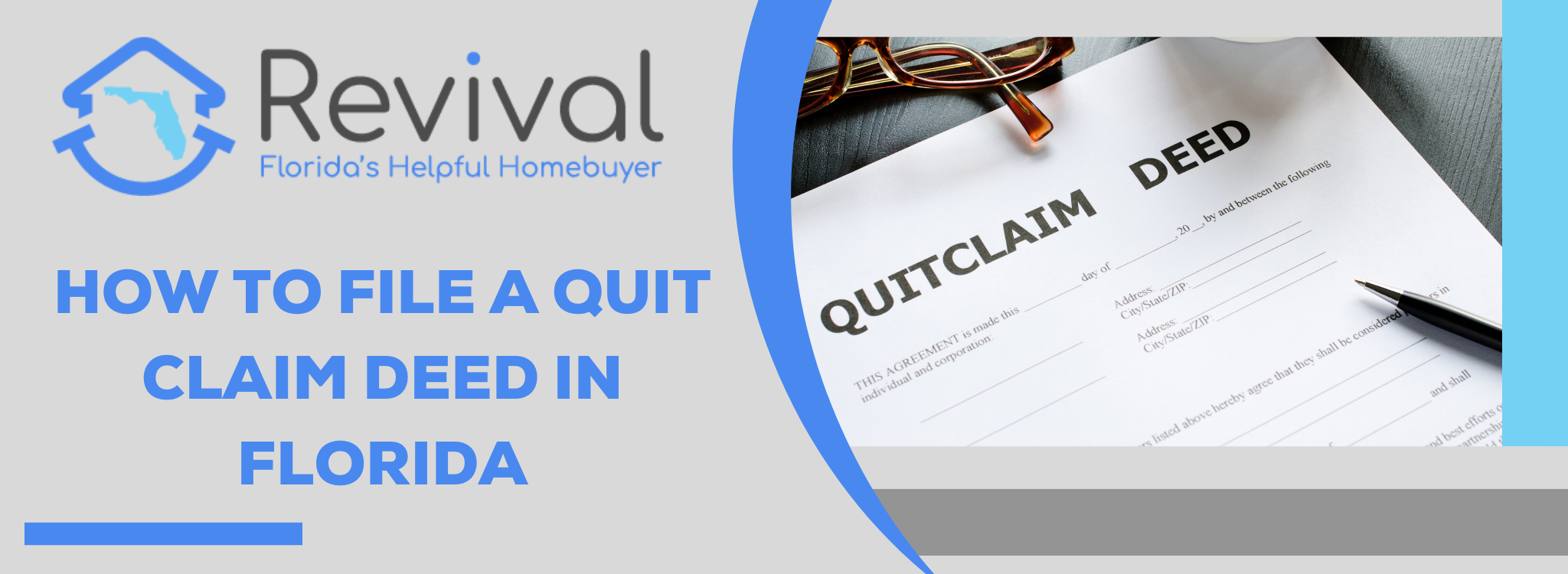
How to Complete a Quitclaim Deed in Florida
Completing a quitclaim deed in Florida might seem tough, but it gets easier if you have the right information. A quitclaim deed is a legal paper you use to transfer property ownership without promising the title is clear. If you’re considering using one, know what steps and rules are involved.
What Information Is Required on a Quitclaim Deed?
To fill out a quitclaim deed form for property in Florida, you need certain details:
- Grantor and Grantee Names: The grantor transfers the property, and the grantee receives it.
- Property Description: This means the legal description of the property. You can find this on the current deed or property tax records.
- Date of Transfer: When the property changes hands.
- Consideration: This is what the grantee gives for the property. Sometimes, it’s zero dollars, but you must mention it.
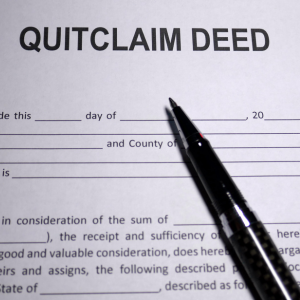
Ensure all details are correct so there are no problems when submitting it.
Where Do You Submit the Quitclaim Deed in Florida?
After you finish the quitclaim deed, you must take it to the county clerk’s office where the property is. The deed goes into public records there. Check with your local court clerk to know exactly where to submit a quitclaim deed in Florida. This tells everyone that the property has a new owner.
Are There Any Witness or Notary Requirements?
In Florida, you need witnesses and a notary for a quitclaim deed. Here’s what you need:
- Notarization: A licensed notary public has to oversee and verify the signatures on the quitclaim deed.
- Witnesses: Two witnesses must sign the deed along with the grantor.
These steps help make sure the property transfer is clear and can stop arguments later.
Legal Implications of Filing a Quitclaim Deed
Filing a quitclaim deed changes property rights differently than other deeds. It transfers ownership but doesn’t promise a problem-free title. Knowing these legal effects is important.
How Does a Quitclaim Deed Differ Legally from Other Deeds?
A quitclaim deed is not the same as a warranty deed. A warranty deed offers protection and assures the grantee that the property title is clear. A quitclaim doesn’t offer such guarantees. So, any title issues stay with the property after it’s handed over.

What Are the Tax Consequences of a Quitclaim Deed?
Before you file a quitclaim deed, think about possible tax impacts:
- Documentary Stamp Tax: Florida asks for this tax based on what the grantee pays or the property’s value.
- Gift Tax: If the property is a gift, the grantor might have to deal with federal gift tax rules.
- Capital Gains Tax: Though not often a concern here, selling the property later might mean paying capital gains tax if its value changes.
Talk to a tax expert for advice that fits your case.
Can a Quitclaim Deed Be Refuted?
Disputing a quitclaim deed can happen if someone claims there’s fraud, pressure, or mistakes in how it was done. These legal challenges can be complicated and take time to sort out. It’s smart to get legal help to understand possible risks and how to handle them.
For more help with property issues, Revival Home Buyer can guide you through real estate matters in Florida.
Tips for Preparing a Quitclaim Deed
How to Ensure Accuracy When Filling Out a Quitclaim Deed Form
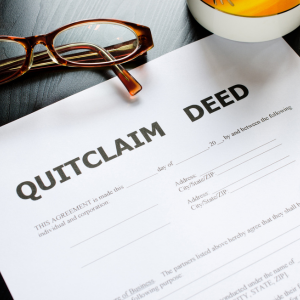
When you fill out a quitclaim deed form, it’s important to be accurate. Start by putting the right information in the form. Check all names and property details carefully to avoid mistakes. Legal advice can help, especially if you’re in Florida, where the laws might differ. A lawyer can make sure your document is correct and complete.
Common Mistakes to Avoid in Quitclaim Deed Preparation
To keep things simple, avoid mistakes when preparing a quitclaim deed. Common errors include spelling names wrong, getting property details mixed up, and forgetting signatures. Make sure every detail matches other legal documents. Take your time so you don’t mess up.
What Legal Advice Should You Seek Before Filing?
Before you file a quitclaim deed, get some legal advice. Talk to an attorney who knows about property law, especially if you are in Florida. They can tell you if there are any problems or taxes you need to think about. A lawyer can check your quitclaim deed to ensure it’s safe and protects you.
Recording a Quitclaim Deed with the County Clerk
How Long Does It Take for a Quitclaim Deed to Be Recorded?

After you file your quitclaim deed with the county clerk, the time it takes to record it can vary. Usually, it takes a few days to several weeks, depending on how busy the county clerk’s office is. Ask the clerk how long it will take so you know what to expect.
What Are the Fees Associated with Recording a Quitclaim Deed?
Recording a quitclaim deed comes with fees. These fees can change depending on where you are and your transaction details. The county clerk’s office charges for document recording and other costs. Check with your local county clerk to determine how much you must pay.
Using Quitclaim Deeds in Estate Planning
How Can Quitclaim Deeds Facilitate Estate Transfers?
Quitclaim deeds help move property from one person to another quickly. They are useful in estate planning when ownership is clear, and no promises about the property are needed. This tool is often used between family members to make estate transactions easier. If things get complicated, it’s smart to talk to an estate attorney to ensure everything is done right.
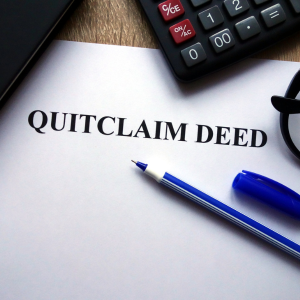
Can Quitclaim Deeds Be Used in Trust and Estate Planning?
Yes, quitting claim deeds can help with trust and estate planning. They can move property into a trust, which makes managing things easier and may even lower taxes. But doing it right requires careful planning and legal advice. An estate attorney can provide this guidance and help set up your trust properly.
What Are the Benefits of Using a Quitclaim Deed in Estate Management?
Quitclaim deeds make changing who owns a property straightforward in estate management. They’re especially good for passing real estate to family members or putting it into trusts. This way, you can manage an estate smoothly without going through long court processes. But remember, quitclaim deeds don’t protect against claims from others.
Impact of a Quitclaim Deed on Property Ownership
What Happens to Property Ownership After Filing a Quitclaim Deed?
When you file a quitclaim deed, it immediately changes who owns the property. It gets recorded in public records, and the owner is officially changed67. The effect on property ownership is quick, but since quitclaim deeds don’t promise a clear title, you should check everything carefully before filing.

How Does a Quitclaim Deed Affect Joint Ownership?
With joint ownership, a quitclaim deed can transfer one person’s share to another. This is helpful during events like divorce or when one owner wants to give up their part. However, changing co-ownership this way can have legal effects, so it’s important to get advice from a property attorney to protect all involved.
Are There Risks Involved in Transferring Property via Quitclaim Deed?
Transferring property with a quitclaim deed has risks because it doesn’t guarantee the property is free from claims or debts. It’s smart to get legal advice to understand these risks and keep the property safe during the transfer.
Role of Quitclaim Deeds in Real Estate Transactions
A quitclaim deed is a simple way to transfer property ownership. Unlike other deeds, it doesn’t promise that the property is free from problems like debts. Both sellers and buyers should know what a quitclaim deed means in real estate deals. Talking to a real estate attorney can help avoid risks and simplify the process.
How Are Quitclaim Deeds Utilized in Property Sales?
In property sales, a quitclaim deed lets a seller quickly hand over their share of a property. This type of deed is often used within families, like when someone gives property to a relative or after a divorce. The seller must complete and sign the right papers to file a quitclaim deed. Even though they are less formal than other deeds, recording them legally is important, especially in cases like family short sales or property transfers during separation.
Can Quitclaim Deeds Be Used for Commercial Properties?

Yes, you can use quitclaim deeds for commercial properties, but it’s not as common. In states like Florida, there are special rules when using a quitclaim deed in any real estate deal. Getting legal advice to understand the rules is a good idea, especially for complex commercial transactions fully. While they make the transfer process easier, they give little protection to the buyer, so legal help is important.
What Should Sellers Know About Using Quitclaim Deeds?
Sellers considering using a quitclaim deed need to know the legal tips for their situation. The filing process can vary by place, such as how you file a quitclaim deed in Florida. This kind of deed doesn’t guarantee the property title is clear. Talking to a real estate attorney can help sellers learn about risks and the right steps to transfer the property legally.
Differences Between Quitclaim and Warranty Deeds
Home buyers need to know the difference between a quitclaim deed and a warranty deed. A quitclaim deed doesn’t provide any promises about the property’s title, while a warranty deed offers more protection by ensuring a clear title. Knowing what each kind does can help you choose the best property deal.
What Protections Does a Warranty Deed Offer Compared to a Quitclaim Deed?
A warranty deed provides strong protections that a quitclaim deed does not. It promises that the property’s title is free from claims or liens, giving buyers security. These protections improve warranty deeds for most deals where ensuring the title’s safety is key. Quitclaim deeds might be better for transfers between family members or trusted parties.
When Is It Preferable to Use a Quitclaim Deed Over a Warranty Deed?

Using a quitclaim deed works well when the people trust each other, like family members. It’s also useful when the property transfer doesn’t require detailed title checks. However, a warranty deed might be better if a buyer needs a full title guarantee, as in most normal sales.
How Do Quitclaim Deeds and Warranty Deeds Impact Home Buyers?
Home buyers should consider how each type of deed affects risks and the whole transaction. With a quitclaim deed, the buyer accepts the chance of possible title issues, which might affect future sales. In contrast, a warranty deed ensures the buyer gets a property with a clear title, reducing possible legal problems. Knowing these effects helps buyers make smart choices about their deals.
Common Situations for Using Quitclaim Deeds
Why Are Quitclaim Deeds Commonly Used in Divorce Settlements?
Quitclaim deeds are often used during a divorce to transfer property ownership. When couples split up, these deeds help change who owns what quickly. This makes it easier to divide property and ensures the new owner is legally recognized.
How Are Quitclaim Deeds Applied in Family Property Transfers?
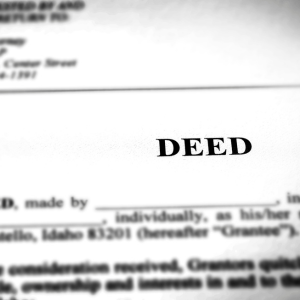
In family property transfers, quitclaim deeds are a big help. They let family members transfer real estate smoothly. The process involves preparing the deed, getting legal advice, and filing it correctly. While useful, having legal advice makes sure everything is fair and protects everyone’s interests.
Are Quitclaim Deeds Suitable for Adding or Removing a Spouse from a Property Title?
Quitclaim deeds can help when adding or removing a spouse from a property title. They make changing ownership easy. But knowing the legal stuff is important. Getting advice from a legal expert helps avoid problems and ensures the ownership change is done right.
Understanding Public Records and Quitclaim Deeds
How Are Quitclaim Deeds Entered into Public Records?
To enter a quitclaim deed into public records, you submit it to the county clerk’s office. Once it’s filed, it becomes official proof of ownership changes. This record is important for clear property rights.
What Access Do Individuals Have to Quitclaim Deed Records?
Thanks to their legal rights, people can access public records, like quitclaim deed records. Depending on local rules, you can usually see these documents at the county clerk’s office or online. Access helps keep things transparent so you can check property ownership details.
How Does Public Record Entry Protect Property Rights?
Recording quitclaim deeds in public records provides needed legal protection for property rights. Official documentation of transfers makes them clear and verifiable, reducing disputes. This protection keeps ownership clear for both current owners and future buyers.
Read on to discover how to sell a house in Florida. These insights are relevant across the state, including cities like Brandon, Clearwater, St. Petersburg, Tampa, and surrounding areas. For more help, Contact Us at (813) 548-3674.
FAQs:
What is a quit claim deed and how is it different from other deed types?
A quit claim deed lets someone give their property ownership to another person, but it doesn’t promise that the title is clear. It’s often used between family members or during a divorce.
Can I file a quit claim deed myself, or do I need an attorney in Florida?
You can file a quit claim deed yourself in Florida, but it’s a good idea to talk to an attorney to ensure that everything is done correctly.
Where do I file a quit claim deed in Florida?
You need to file the quit claim deed with the Clerk of the Circuit Court in the county where the property is, like Miami Dade or Broward County.
What fees are involved when filing a quit claim deed in Florida?
The fees change by county but are usually about $10 for the first page. There might also be extra taxes based on the property’s value.
Do I need witnesses or a notary for a quit claim deed in Florida?
Yes, a quit claim deed in Florida needs two witnesses and a notary to make it official.
How does adding a spouse to a quit claim deed affect my property in Florida?
If you add a spouse, both of you now own the property. This can affect taxes, so it’s smart to ask a professional.
What are the tax implications of using a quit claim deed in Florida?
Using a quit claim deed might mean paying a tax based on the mortgage. Check with a tax expert to know more.
Can a quit claim deed transfer property after death in Florida?
A quit claim deed is not usually used to transfer property after death. Other tools, like a will or trust, are better for that.
Key Insights
- Learn how to file a quitclaim deed in Florida and make sure it meets all signature and witness needs to be valid.
- We offer easy-to-follow help filing a quitclaim deed in Florida, including the costs and papers you need.
- Know about Florida quit claim deed laws, which discuss adding a spouse or handling divorce cases.
- Find out how to download the Florida quit claim deed form in PDF to speed up your work.
- Get key facts about quit claim deeds for homestead property or married couples in Florida.
- Discover how to handle quit claim deed issues, such as escrow, mortgages, and notary public needs.
- We talk about the role of title insurance, disclaimers, and affidavits in making your estate deals safe.
- Receive expert tips on protecting your data, understanding terms of service, and securing data related to deed transactions.
- Stay updated with our newsletter, which has news on quit claim deed requirements and legal updates in Florida.
More Resources To Help Sell A Florida House


